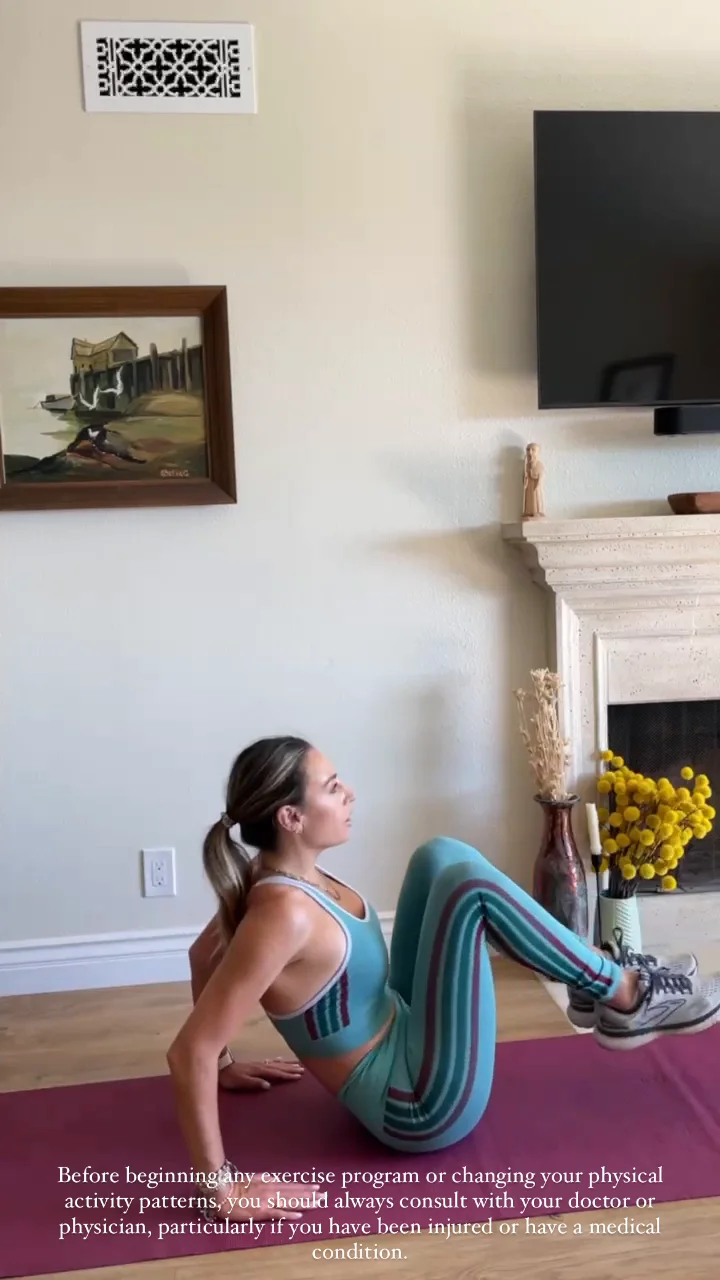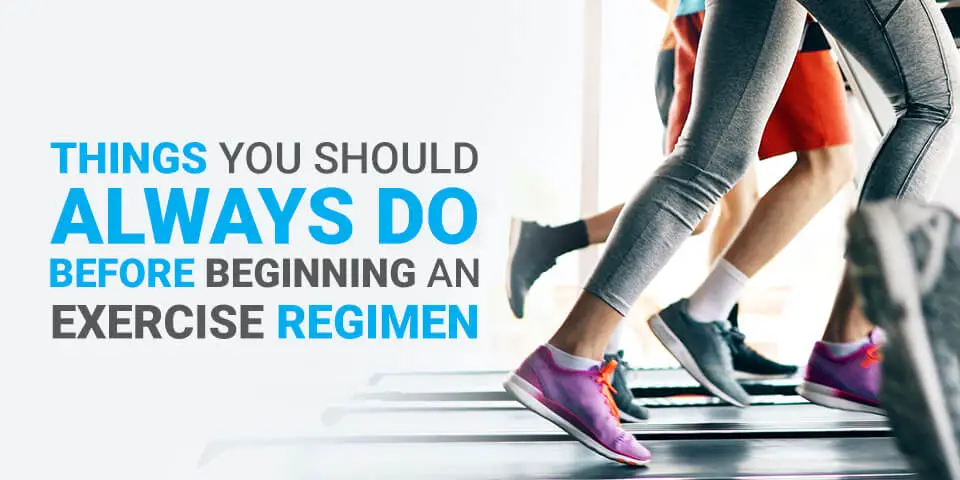Before beginning any exercise regimen, always consult with a healthcare professional. This ensures your safety and personalizes your workout plan.
Starting an exercise regimen can be exciting and beneficial. Consulting with a healthcare professional is crucial to identify any underlying health issues. Personalized advice helps in setting realistic fitness goals. It also reduces the risk of injuries. Knowing your physical limitations allows for a tailored workout plan.
This approach ensures long-term success and consistency. Exercise can improve mental health, boost energy, and enhance overall well-being. Proper guidance can maximize these benefits. Always prioritize your health and safety by seeking professional advice before starting any new fitness routine. This initial step can lead to a healthier, more active lifestyle.
Credit: vimeo.com
Consult A Healthcare Professional
Before beginning any exercise regimen, it’s crucial to consult a healthcare professional. This step ensures that you start your fitness journey safely. A healthcare professional can provide you with personalized advice. They understand your health history and current condition. Consulting them can help prevent injuries and health complications.
Assess Your Health
Start by assessing your overall health. A healthcare professional will review your medical history. They will check for any existing conditions. This might include heart disease, diabetes, or joint issues. Understanding your health status helps in creating a suitable exercise plan.
Get Medical Clearance
Getting medical clearance is essential. This is especially important if you have chronic conditions. A doctor might perform specific tests. These tests can include blood pressure checks, heart rate monitoring, and cholesterol levels. The results will guide your exercise intensity and type.
Here is a simple table that outlines the benefits of getting medical clearance:
| Benefit | Description |
|---|---|
| Safety | Reduces the risk of injuries and health issues. |
| Personalized Plan | Creates an exercise plan tailored to your health needs. |
| Peace of Mind | Gives you confidence to start your exercise regimen. |
Here are some key points to remember:
- Always consult a healthcare professional before starting.
- Understand your current health status.
- Get necessary tests and medical clearance.
By following these steps, you ensure a safe and effective start to your fitness journey.
Set Realistic Goals
Setting realistic goals is crucial before beginning any exercise regimen. This helps you stay motivated and on track. Start with small, achievable targets. Gradually increase the difficulty as you progress.
Define Your Objectives
First, identify what you want to achieve. Is it losing weight, building muscle, or improving stamina? Be specific about your goals. Instead of saying, “I want to lose weight,” aim for “I want to lose 10 pounds in three months.” This specificity will guide your workout plan and keep you focused.
Track Your Progress
Keep a record of your achievements. Use a journal, app, or spreadsheet. Tracking helps you see your improvements. It also shows where you might need to adjust your plan. Celebrate small victories to stay motivated.
| Objective | Time Frame | Tracking Method |
|---|---|---|
| Lose 10 pounds | 3 months | Weight Scale |
| Run 5K | 6 weeks | Running App |
| Build Muscle | 4 months | Progress Photos |
Using a combination of these methods can provide a comprehensive view of your progress. By defining objectives and tracking them, you set yourself up for success.
- Set specific goals for better focus.
- Track your progress to stay motivated.
- Celebrate small wins to keep going.
Choose The Right Exercise
Starting an exercise regimen is a great step. The key to success is choosing the right exercise. This ensures that you stay motivated and reach your goals. Let’s dive into how to make the right choice.
Identify Your Interests
Choosing exercises that you enjoy is crucial. Think about activities that make you happy.
- Do you like dancing? Try Zumba or dance classes.
- Enjoy nature? Hiking or walking in parks can be great.
- Love the water? Swimming might be your best bet.
Identifying your interests will help you stick to your routine. You are more likely to continue exercising if it feels fun.
Consider Your Fitness Level
Understanding your fitness level is important. This helps you choose safe and effective exercises.
| Fitness Level | Recommended Exercises |
|---|---|
| Beginner | Walking, light jogging, basic yoga |
| Intermediate | Running, swimming, strength training |
| Advanced | High-intensity interval training (HIIT), advanced yoga, marathon training |
If you are a beginner, start with low-impact activities. For intermediate levels, mix cardio and strength training. Advanced exercisers can challenge themselves with intense workouts.
By considering these factors, you can choose the right exercise for you. This will help you stay consistent and reach your fitness goals.
Create A Balanced Routine
Before starting any exercise regimen, it is essential to create a balanced routine. A balanced routine ensures you target all muscle groups and avoid injury. It also helps in achieving overall fitness. To create a balanced routine, consider including various types of exercises. This includes cardio and strength training.
Include Cardio
Cardio exercises are crucial for heart health and stamina. They help in burning calories and reducing body fat. Examples of cardio exercises include:
- Running
- Cycling
- Swimming
- Jumping rope
Try to include 30 minutes of cardio, at least three times a week. This will improve your cardiovascular health and boost your energy levels.
Add Strength Training
Strength training helps build muscle and increases bone density. It also improves your metabolism, making it easier to maintain a healthy weight. You can incorporate:
- Weight lifting
- Bodyweight exercises
- Resistance band exercises
Include strength training exercises two to three times a week. Focus on different muscle groups to avoid overworking any single area.
Here’s a simple weekly plan:
| Day | Exercise |
|---|---|
| Monday | Cardio |
| Tuesday | Strength Training |
| Wednesday | Rest or Light Activity |
| Thursday | Cardio |
| Friday | Strength Training |
| Saturday | Cardio |
| Sunday | Rest |
Remember to listen to your body and adjust the plan as needed. Creating a balanced routine will set you up for long-term success.
Focus On Proper Nutrition
Before beginning any exercise regimen, it’s crucial to focus on proper nutrition. Your body needs the right fuel to perform well and recover quickly. Proper nutrition ensures you have energy and can build muscle effectively. Let’s dive into some key aspects of nutrition that can help you succeed in your fitness journey.
Eat Balanced Meals
Eating balanced meals is essential for providing your body with the nutrients it needs. A balanced meal includes:
- Proteins: Help in muscle repair and growth. Examples: chicken, beans, tofu.
- Carbohydrates: Provide energy for your workouts. Examples: whole grains, fruits, vegetables.
- Fats: Support hormone production and joint health. Examples: avocados, nuts, olive oil.
Make sure each meal includes a mix of these nutrients. This helps maintain energy levels and supports overall health.
Stay Hydrated
Hydration is vital for exercise performance and recovery. Water helps regulate body temperature, lubricate joints, and transport nutrients. Aim to drink:
- At least 8 cups of water daily.
- More if you exercise intensely or in hot weather.
Besides water, you can also include hydrating foods. Examples: cucumbers, watermelon, oranges.
By focusing on proper nutrition, you set yourself up for success. Balanced meals and adequate hydration are foundational to any fitness journey.

Credit: connect.advocare.com
Invest In Quality Gear
Before beginning any exercise regimen, it’s crucial to invest in quality gear. Proper gear enhances performance and prevents injuries. Here are some key aspects to consider:
Select Proper Footwear
Proper footwear provides support and comfort. Choose shoes designed for your specific activity. Running shoes differ from hiking boots. Look for features like:
- Cushioning
- Breathability
- Arch support
- Durability
Visit a specialty store for a fitting. Experts can assess your feet. They will recommend the best shoes for your needs.
Wear Comfortable Clothing
Clothing impacts your workout experience. Wear clothes that allow freedom of movement. Choose fabrics that wick away sweat. Look for:
- Moisture-wicking materials
- Breathable fabrics
- Flexible fits
Layering is essential in colder weather. Wear a base layer to keep warm. Add a lightweight jacket for wind protection.
| Activity | Recommended Gear |
|---|---|
| Running | Running shoes, breathable clothing, moisture-wicking socks |
| Yoga | Flexible pants, tank top, yoga mat |
| Hiking | Hiking boots, layered clothing, backpack |
Quality gear makes a big difference. It boosts performance and ensures safety. Always choose gear wisely before starting any exercise.
Warm Up And Cool Down
Starting an exercise regimen requires careful preparation. The most crucial steps are warming up and cooling down. These steps help prevent injuries and improve performance. Let’s delve into why these steps are essential.
Stretch Before Exercise
Before diving into any workout, always stretch. Stretching prepares your muscles for action. Here are some effective stretches:
- Hamstring Stretch: Sit on the ground, extend one leg, and reach for your toes.
- Quadriceps Stretch: Stand on one leg, grab your other ankle, and pull it toward your buttocks.
- Shoulder Stretch: Bring one arm across your body and use the other arm to pull it closer.
Hold each stretch for at least 20 seconds. Ensure you breathe deeply. This helps your muscles relax and prepare for the workout.
Relax After Workout
After your exercise, it’s vital to cool down. This helps your heart rate return to normal. Cooling down also reduces muscle soreness. Here are some effective cool-down activities:
- Slow Jogging: Jog slowly for about five minutes.
- Walking: Walk for another five minutes to help your body relax.
- Light Stretching: Stretch the muscles you used during your workout.
Take deep breaths during these activities. This helps oxygenate your muscles and aids in recovery.
Listen To Your Body
Before starting any exercise regimen, it’s crucial to listen to your body. Your body sends signals that can help prevent injuries and ensure effective workouts. Ignoring these signals can lead to overtraining or serious injury.
Avoid Overtraining
Overtraining can cause fatigue and reduce performance. To avoid this, follow these tips:
- Start with light exercises and gradually increase intensity.
- Take rest days to allow your muscles to recover.
- Pay attention to how your body feels during workouts.
Overtraining can also weaken your immune system. It’s essential to balance exercise with rest.
Recognize Injury Signs
Recognizing early signs of injury can prevent long-term damage. Watch out for:
- Persistent pain or discomfort during exercise.
- Swelling or bruising around joints.
- Decreased range of motion or flexibility.
If you notice any of these signs, stop exercising immediately. Consult a healthcare professional if the symptoms persist.
Credit: vimeo.com
Frequently Asked Questions
What Should You Always Do Before You Start Exercising?
Always warm up your muscles, stay hydrated, check your gear, set clear goals, and know your fitness limits before exercising.
When Starting An Exercise Program What Things Should You Consider Before Starting?
Before starting an exercise program, consider your fitness level, health conditions, goals, available time, and proper equipment. Consult a doctor if needed.
What Is The Most Important Action To Take Before Beginning An Exercise Program?
Consult a healthcare professional to assess your current health status and identify any potential risks.
What Is The First Thing You Should Do Before You Start An Exercise Program On Quizlet?
Consult your doctor before starting an exercise program on Quizlet. Ensure you’re healthy enough for physical activity.
Conclusion
Starting an exercise regimen requires careful planning and preparation. Always consult a healthcare professional before beginning. Understanding your body’s limits is crucial. Take the time to set realistic goals and choose suitable exercises. Remember, a well-planned routine leads to better health and reduces the risk of injury.
Prioritize your well-being and enjoy a safe fitness journey.

